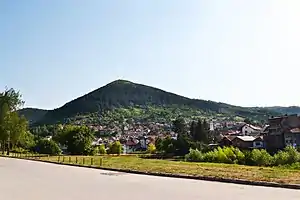Visočica hill
Visočica (pronounced [ʋi.sɔ̌.tʃi.tsa]) (also known as Brdo Grad ([br̩̂dɔ ɡrâːd]) (Bosnian: Hill Town) is a 213-metre-high hill in Bosnia and Herzegovina famous as the site of the Old town of Visoki [ʋǐsɔkiː].

The hill has for more than a decade been the subject of a pseudoarchaeological belief that it is part of an ancient man-made pyramid complex. This notion is rejected by archaeologists and geologists.
Old town of Visoki

The Old town of Visoki was a famous medieval royal castle town during the fourteenth century, located in Visoko [ʋisɔkɔ], Bosnia and Herzegovina. The first mention of the town was on 1 September 1355, in the charter "in castro nosto Visoka vocatum" written by Tvrtko I of Bosnia while he was a young ban.[1] The town appears to have been abandoned before 1503, as it is not mentioned in the Turkish-Hungarian treaty that was established that year.[2] In the year 1626, Đorđić mentioned Visoki among abandoned towns.[3]
Pseudoscientific pyramid claims
Visočica hill came to international attention in October 2005, following a campaign to promote the scientifically unsupported idea that it is the largest of a group of ancient man-made pyramids. This idea originated with Houston-based expatriate Bosnian author and businessman Semir Osmanagić who has since turned the site into a tourist destination.
All scientific investigations have concluded that Visočica hill and the surrounding hills are natural geological formations known as a flatirons, and no scientific study has demonstrated the existence of man-made pyramids in Bosnia.[4][5][6] Archaeologists have criticised the Bosnian authorities for supporting the pyramid claim saying, "This scheme is a cruel hoax on an unsuspecting public and has no place in the world of genuine science."[7]
As of 2017, Osmanagić continues to run his project at Visočica, and to link the hill to long-standing non-scientific notions such as free energy and ancient astronauts.[8]
See also
References
- Commission to Preserve National Monuments of Bosnia and Herzegovina (3 April 2009). "Povijesno područje – Stari grad Visoki". Commission to Preserve National Monuments of Bosnia and Herzegovina. Archived from the original on 30 March 2012. Retrieved 3 September 2011.
- Commission to Preserve National Monuments of Bosnia and Herzegovina (3 April 2009). "Povijesno područje – Stari grad Visoki". Commission to Preserve National Monuments of Bosnia and Herzegovina. Archived from the original on 30 March 2012. Retrieved 3 September 2011.
- Commission to Preserve National Monuments of Bosnia and Herzegovina (3 April 2009). "Povijesno područje – Stari grad Visoki". Commission to Preserve National Monuments of Bosnia and Herzegovina. Archived from the original on 30 March 2012. Retrieved 3 September 2011.
- Pyramid No More, Sub Rosa, Issue 6, Oct 2006.
- The great Bosnian pyramid scheme by Anthony Harding, British Archaeology November/December 2006
- John Bohannon, Mad About Pyramids, Science Magazine, 22 September 2006.
- Declaration from the European Association of Archaeologists Archived 2011-07-17 at the Wayback Machine, 11 Dec 2006
- Austin, Jon (March 1, 2017). "'Ancient pyramid' discovery key to Nikola Tesla's communication with aliens, says expert". The Daily Express. Retrieved March 4, 2017.
External links
- Old town of Visoki becomes a national landmark (in Bosnian)